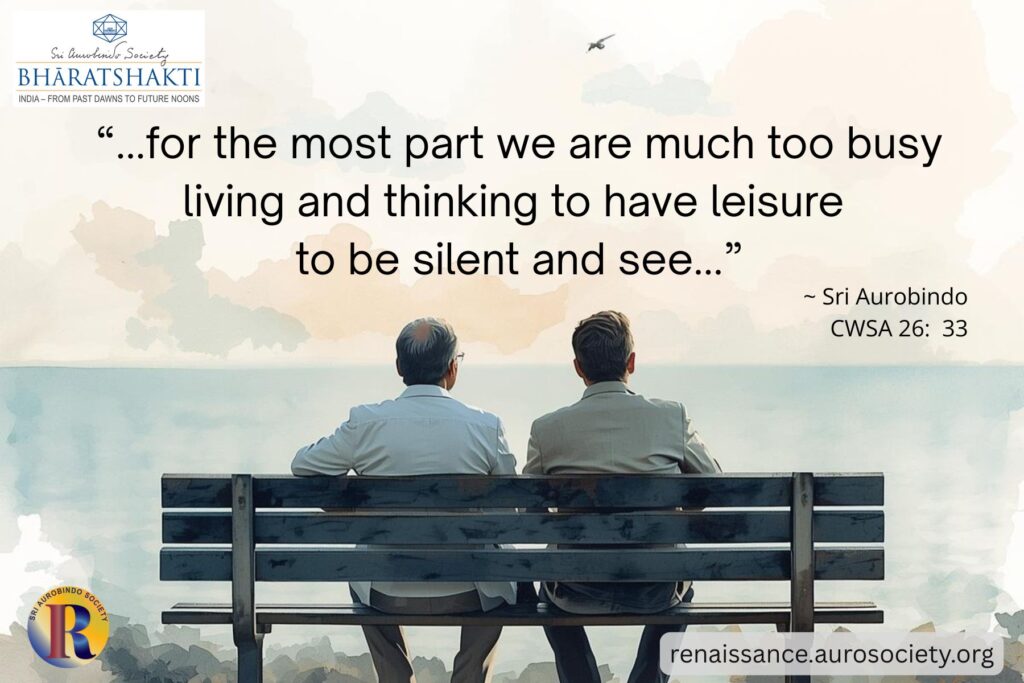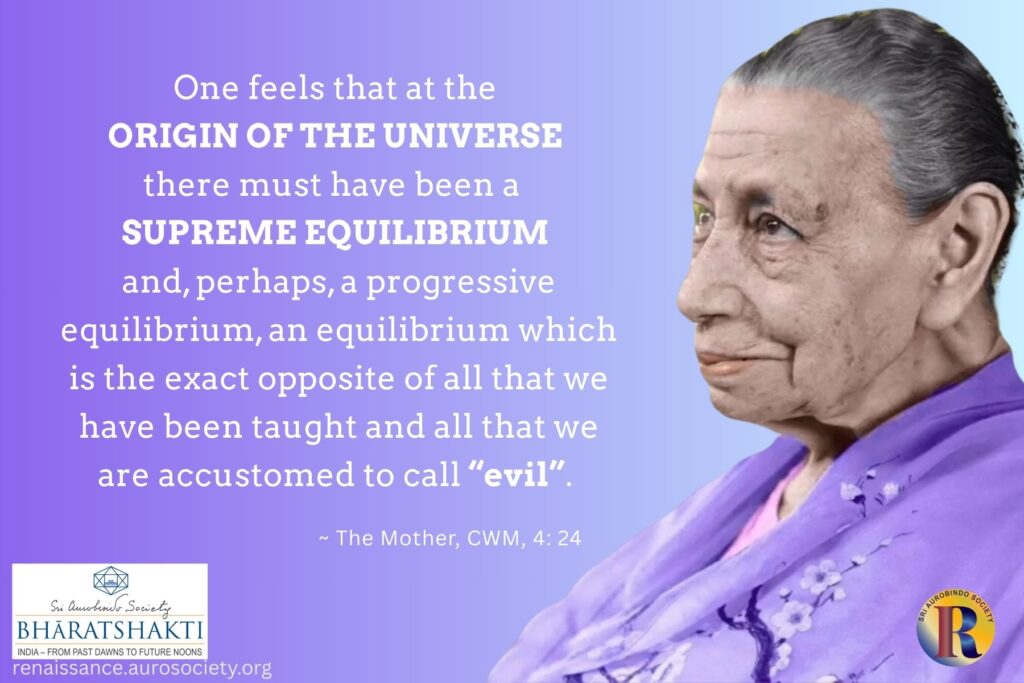Editor’s Note: In the letters featured here, Sri Aurobindo emphasizes the importance of sufficient sleep for a normal healthy life as well as for one’s sadhana. Insufficient sleep weakens the nervous envelope and leads to tamas. He also stresses that 7 to 8 hours of sleep is needed unless an individual is much advanced in sadhana.
🌸🌸🌸
Insufficient sleep weakens the nervous envelope.
It is not a right method to try to keep awake at night; the suppression of the needed sleep makes the body tamasic and unfit for the necessary concentration during the waking hours.
The right way is to transform the sleep and not suppress it, and especially to learn how to become more and more conscious in sleep itself. If that is done, sleep changes into an inner mode of consciousness in which the sadhana can continue as much as in the waking state, and at the same time one is able to enter into other planes of consciousness than the physical and command an immense range of informative and utilisable experience.
***
By not sleeping enough you weaken the forces of the physical consciousness and so the physical basis of the sadhana is less strong than it should be. It gets more open to the forces of inertia.
***
Is that all your sleep [three-and-a-half hours]? If so, it is far too little. If you do not sleep enough, the body and the nervous envelope will be weakened and the body and the nervous envelope are the basis of the sadhana. […]
***
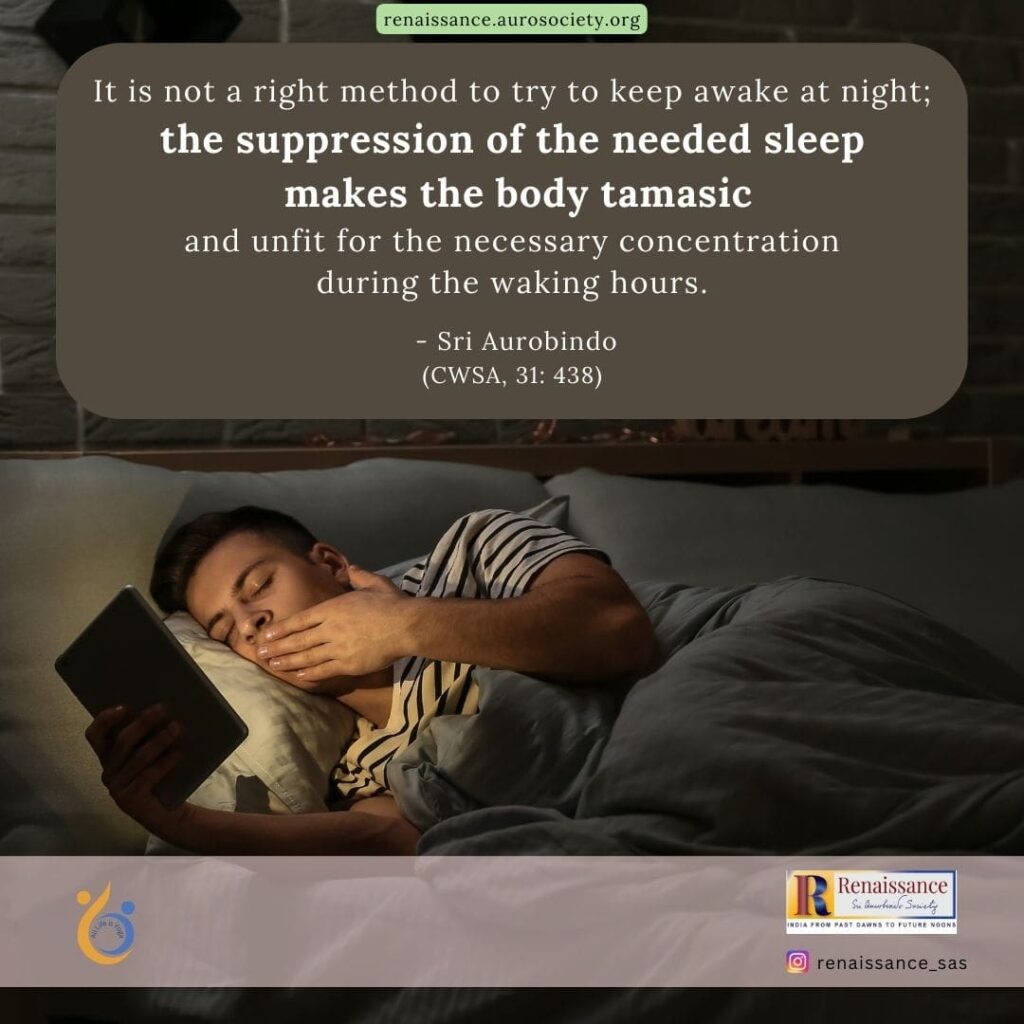
Rest is absolutely necessary for the body and still more for the nervous system; not only for working but for sadhana rest to the body and the nerves is essential.
If you allow them to be strained and tired, they will not be able to adapt themselves readily for the required change, all sorts of things, confusion, suggestions etc. are likely to come into a tired nervous system. They too must be strong and at peace. […]
***
One can assimilate [spiritual experience] in sleep also. Remaining awake like that is not good, as in the end it strains the nerves and the system receives wrongly in an excited way or else gets too tired to receive.
***
You should have continuous sleep at night and sufficient—otherwise you will feel sleepy in the day which will be a hindrance to work.
***
Sleep is necessary; this kind of broken rest is not good. It is the consciousness in sleep itself that has to change.
***
Such pressure [to sleep] only comes (1) when the body needs sleep, not having had enough or because enough rest is not given, (2) when it wants to recuperate after illness or strong fatigue, (3) when there is a pressure from above which the physical consciousness or part of it replies to by trying to go inside.
***
Read:
How to Experience Real Rest
Take care to rest enough. You must guard against fatigue as it may bring relaxation and tamas.
To rest well is not tamas, as some people suppose; it can be done in the right consciousness to maintain the bodily energy—like the śavāsana of the strenuous Hathayogin.
***
Both for fevers and for mental trouble sleep is a great help and its absence very undesirable—it is the loss of a curative agency.
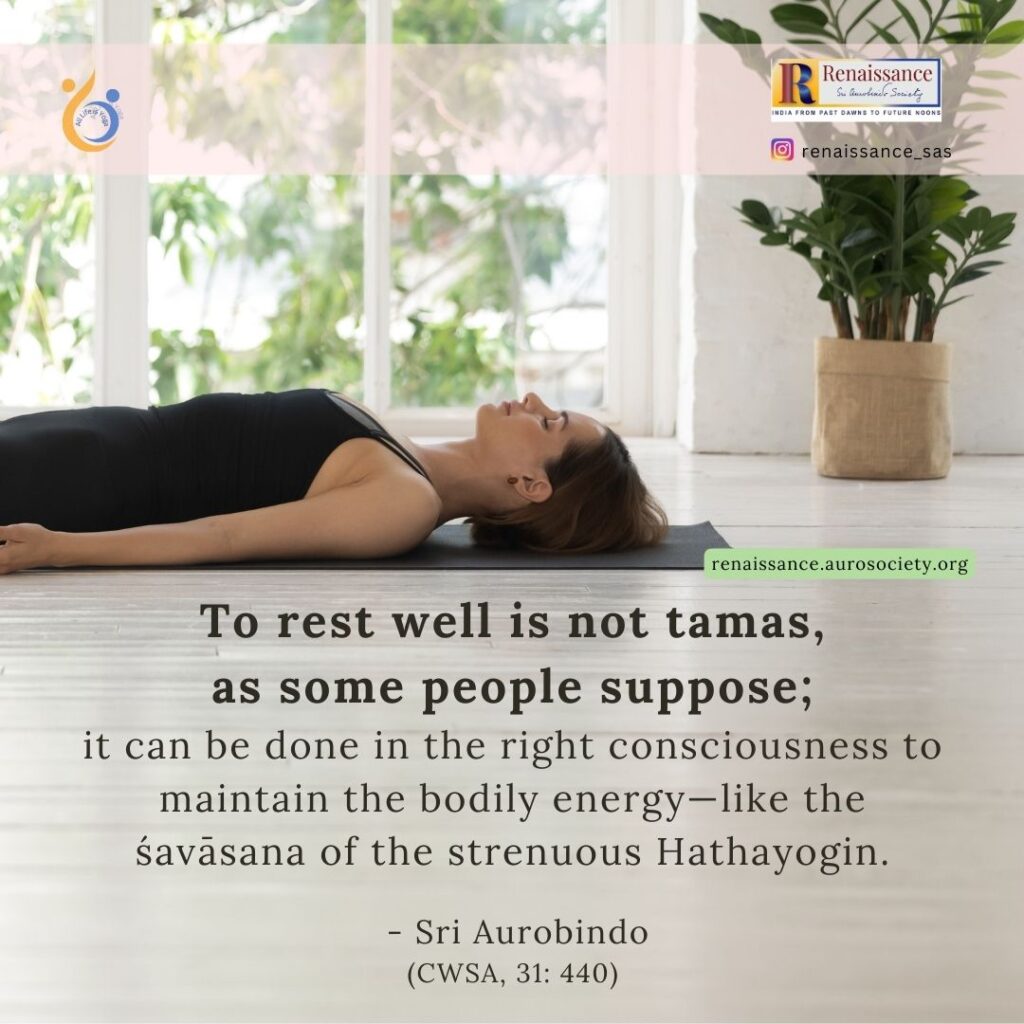
🌸
The Amount of Sleep Needed
The ordinary period of sleep most people give themselves is 8 hours. In bad health (I am not speaking of acute illness) it can extend to 9. 12 hours is excessive unless one is seriously ill or recovering from illness or else has underslept for a long time and the body is making up arrears of needed sleep.
***
8 hours [of sleep] at night is all right, the additional 2 hours is probably necessitated by the bad sleep you were having before. The body recoups itself in this way. That is why it is a mistake to take too little sleep—the body gets strained and has to recoup itself by abnormal sleep afterwards.
***
The normal allowance of sleep is said to be 7 to 8 hours except in advanced age when it is said to be less. If one takes less (5 to 6 for instance) the body accommodates itself somehow, but if the control is taken off it immediately wants to make up for its lost arrears of the normal 8 hours.
So often when one has tried to live on too little food, if one relaxes, the body becomes enormously rapacious for food until it has set right the credit and loss account. At least it often happens like that.
***
It must be the want of sleep that keeps your nervous system exposed to weakness—it is a great mistake not to take sufficient sleep. 7 hours is the minimum needed. When one has a very strong nervous system, one can reduce it to 6, sometimes even 5—but it is rare and ought not to be attempted without necessity.
***
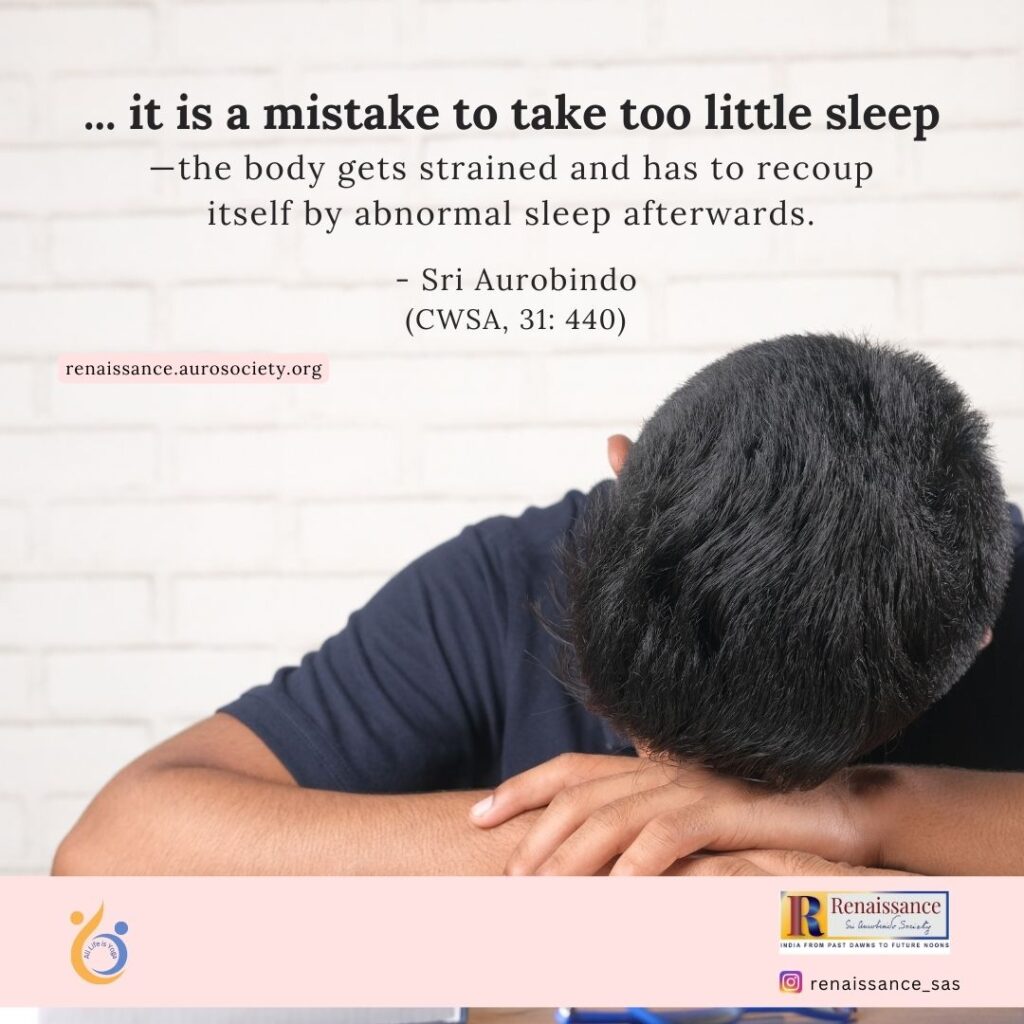
The feeling that you have in the morning proves that you need more sleep, so it is not wise to cut it short to the minimum as that in the end tells on the body. It is better to continue the sleep when you feel sleepy. 7 hours is not too much for sleep.
***
5½ hours [of sleep] is quite insufficient. Six is the absolute minimum, it can go up to seven hours.
***
It is not possible to do at once what you like with the body. If the body is told to sleep only 2 or 3 hours, it may follow if the will is strong enough—but afterwards it may get exceedingly strained and even break down for want of needed rest.
The Yogis who minimise their sleep, succeed only after a long tapasya in which they learn how to control the forces of Nature governing the body.
– Sri Aurobindo (CWSA, Vol. 31, pp. 438-441)
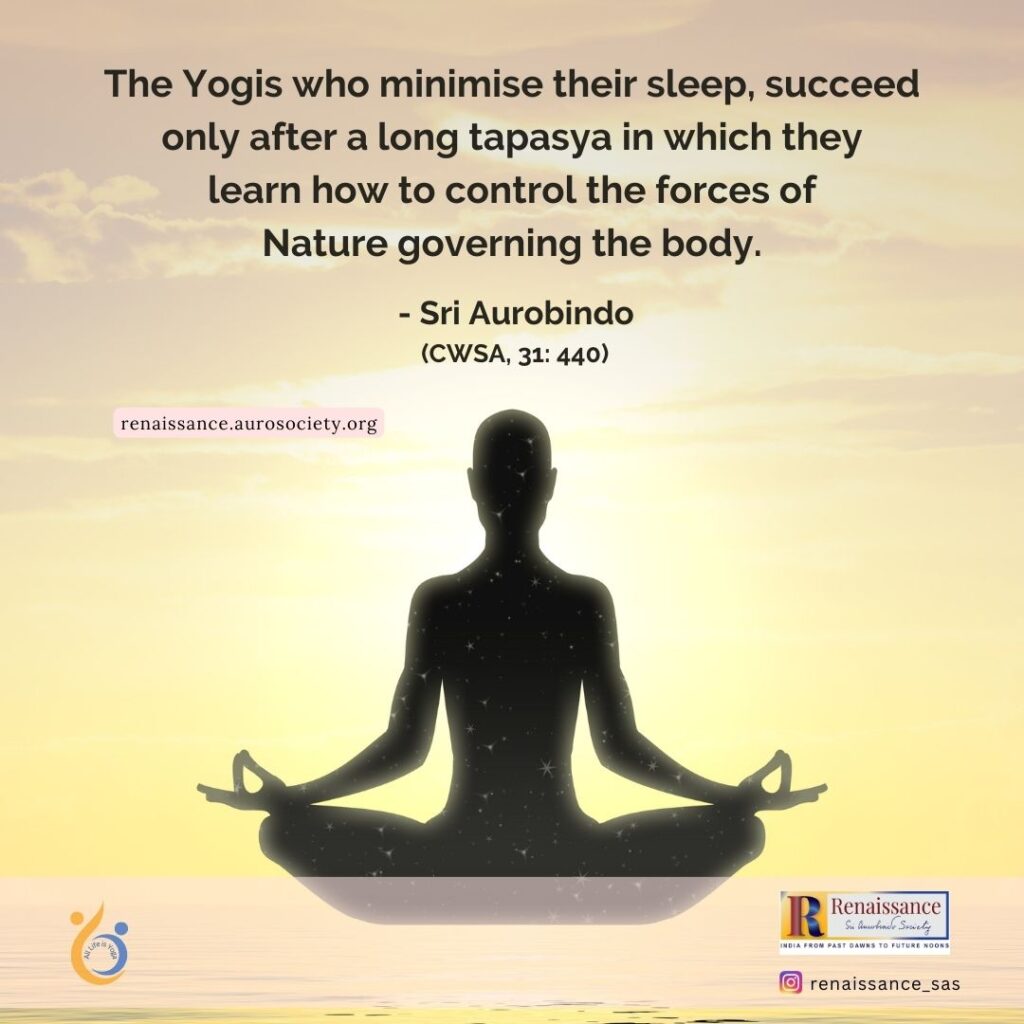
🌸🌸🌸🌸
Also Read:
Preparing for Conscious Sleep
~ Design: Raamkumar


